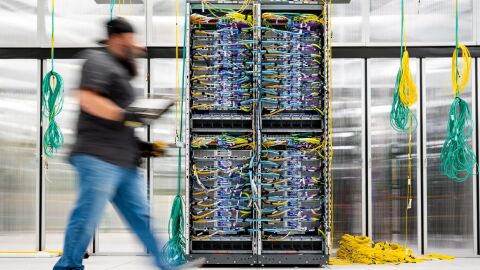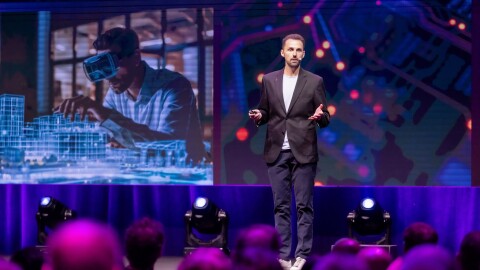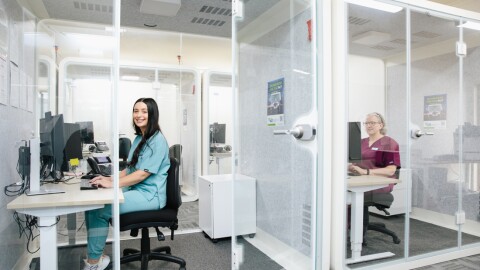Artificial Intelligence (AI) is reshaping the workforce in Australia—from how organisations operate, to how work gets done. Despite the varying levels of AI adoption across the country, the technology will be a game-changer over the next five years.
AI taps into the power of computers and machines to mimic the problem-solving and decision-making capabilities of the human mind. As smart algorithms and automation sweep through industries, the Australian employment landscape is evolving, with humans and machines collaborating like never before. AI is pushing both employers and workers to adapt for a more dynamic workforce and greater productivity.
To better understand emerging AI usage trends, and where workplaces might be headed, Amazon Web Services (AWS) commissioned global research firm, Access Partnership, to conduct an Australian AI skills survey, with more than 1,600 employees and 500 employers surveyed across Australia. The study, titled Accelerating AI Skills: Preparing the Workforce in Australia for Jobs of the Future, shows that AI transformation is happening at a rapid pace, with the majority of employers in Australia expecting to use AI solutions and tools in their organisations by 2028.
Here are the five key takeaways:
1. Most organisations will be AI-enabled by 2028 and expect to benefit from it

Over the next five years, the speed of AI transformation across Australia will be remarkable, with 90% of employers envisioning their organsations to use AI-related solutions by 2028. While most employers (87%) believe their IT departments will be the biggest beneficiary, they also expect sales and marketing (83%), business operations, and research and development departments (82% respectively) to benefit as well.
Employers believe AI can enhance work processes, including automating repetitive tasks (64%), improving workflow and outcomes (60%), and enhancing communication (56%).
2. Generative AI will transform how we work

Generative AI—a type of AI that can create new content and ideas quickly, including conversations, stories, images, videos, music, and more—has captured the attention of the general public in the past year, and will transform how people work. So, it’s not surprising almost nine in 10 Australian employers (84%), and 84% of workers expect to use generative AI tools on the job within the next five years. Both employers and workers highlighted increasing innovation and creativity as the top benefit of generative AI, followed by automating repetitive tasks (61%), improving outcomes (58%), and supporting learning (56%).
Over 90% of respondents believe that generative AI can benefit them at work in at least one way. This enthusiasm is notably high among Generation Z (Gen Z) and Millennial workers, with over 94% reporting at least one benefit, compared to 73% for those aged over 55. This difference underscores the positive outlook of younger workers towards generative AI, as over 91% believe it will positively impact their careers.
3. AI skills could boost pay and accelerate career growth for workers

With considerable potential to improve operational efficiency, worker productivity, and decision-making, surveyed employers in Australia estimate that workers who acquire AI expertise could see their pay jump by 29% or more. While workers from IT departments would potentially see the greatest pay increase (37%), it’s worth noting that non-IT workers are expected to gain as well. Surveyed employers believe professionals in non-tech roles, such as sales and marketing, finance, and business operations, could experience at least a 29% increase than workers without AI skills.
On top of significant salary bumps, four in five (88%) surveyed Australian workers indicated that AI could have some positive impact on their careers. While there is a lack of clarity about the potential career development paths available, many are looking toward upskilling themselves, with 77% being interested to acquire AI skills for career advancement.
The study found that this interest transcends generations with 78% of Gen Z, 83% of Millennials, and 72% of Generation X workers wanting to get equipped with AI skills, and 55% of baby boomers say they would enroll in an AI upskilling course if employers offered it. Overall, workers anticipate that having AI skills would have a positive impact on their careers, including increased efficiency, higher job satisfaction, and faster career progression.
4. The productivity payoff from an AI-skilled workforce could be immense

The productivity payoff refers to the tangible benefits Australia stands to gain from the full adoption and integration of AI tools by workers.
With more workers now expecting to use AI, it has significant potential to boost economic growth and productivity within five years. By 2028, 86% of workers in Australia anticipate incorporating AI into their daily work, with 25% planning to use AI “extensively”.
Surveyed employers in Australia believe that AI has the potential to boost their organisation’s productivity by 46% if utilised to its full potential across all functions. Workers agree, anticipating a productivity boost of 45% from the use of AI on the job. The top three areas for anticipated productivity gains for employers and workers are automating repetitive tasks, enhancing communication, and improving workflow and outcomes.
5. Bridging the AI skills gap through training is mission-critical

Hiring talent with AI skills and expertise is a priority for 63% of surveyed Australian employers, of which three in four (75%) can’t find the AI talent they need. The research also uncovered a training awareness gap, whereby more than seven in 10 (73%) of employers indicated that they don’t know how to implement an AI workforce training program.
On the workers’ side, 73% don’t know what AI skills they need, 76% lack knowledge about available training programs, and 73% aren’t sure about the relevant career paths where AI skills would be useful.
While employers consider technical skills essential for using AI, they also rank creative thinking (51%), critical thinking (50%), and ethics (34%) as important soft skills for working with AI. Ethics and risk management are vital for guarding against potential AI risks, including algorithmic bias, lack of accountability, compliance challenges, and the need for transparency and safety measures.
Building an AI-ready workforce is everyone’s responsibility for future prosperity across Australia
Overall, this important research on AI and the future of work reveals a looming AI skills gap across Australia that needs to be addressed so the country is well positioned to unlock the full benefits of AI. This calls for collaboration between governments, industries, and educators to help employers implement AI training programs, guide workers in matching their AI skillsets to the right roles to harness their newly acquired AI capabilities, and make the most of this evolving technology.
In November 2023, Amazon launched the ‘AI Ready’ initiative that complements AWS’s commitment to provide free cloud computing skills training to 29 million individuals globally by 2025. Through ‘AI Ready’, we now offer a suite of free AI and generative AI training courses, aligned to both technical and non-technical roles, so that anyone can build AI skills.
AWS also announced new generative AI innovations at AWS re:Invent 2023, including Amazon Q—a new generative AI assistant designed for work that can be tailored to businesses. This highlights the need for workers to be equipped with AI skills, in order to unleash the full potential of generative AI innovations.
AWS is proud to have trained more than 400,000 people across Australia with cloud skills since 2017. With the rapid adoption of cloud-enabled technologies like generative AI, more work needs to be done to build an AI-skilled workforce to unleash a culture of innovation and drive productivity in this dynamic region of the world.
Learn more about the Accelerating AI Skills: Preparing the Asia Pacific Workforce for Jobs of the Future report.













